International Business Communication Report on Sainsbury's in India
VerifiedAdded on 2023/06/08
|11
|3288
|72
Report
AI Summary
This report delves into the intricacies of international business communication, using Sainsbury's entry into the Indian market as a case study. It begins with an introduction to international business and India as a developing country, followed by an application of Samovar's theory of intercultural communication. The report critically evaluates cultural sensitivity, emphasizing the importance of networking and research in understanding the Indian market. It then discusses and analyzes various communication barriers, including language, cultural, and psychological challenges. Finally, the report proposes communication strategies and recommendations for Sainsbury's to overcome these barriers and succeed in the Indian market. The report covers topics such as language, culture, intercultural mediation, and subconscious elements in communicative behavior, offering a comprehensive overview of the challenges and opportunities in international business communication.
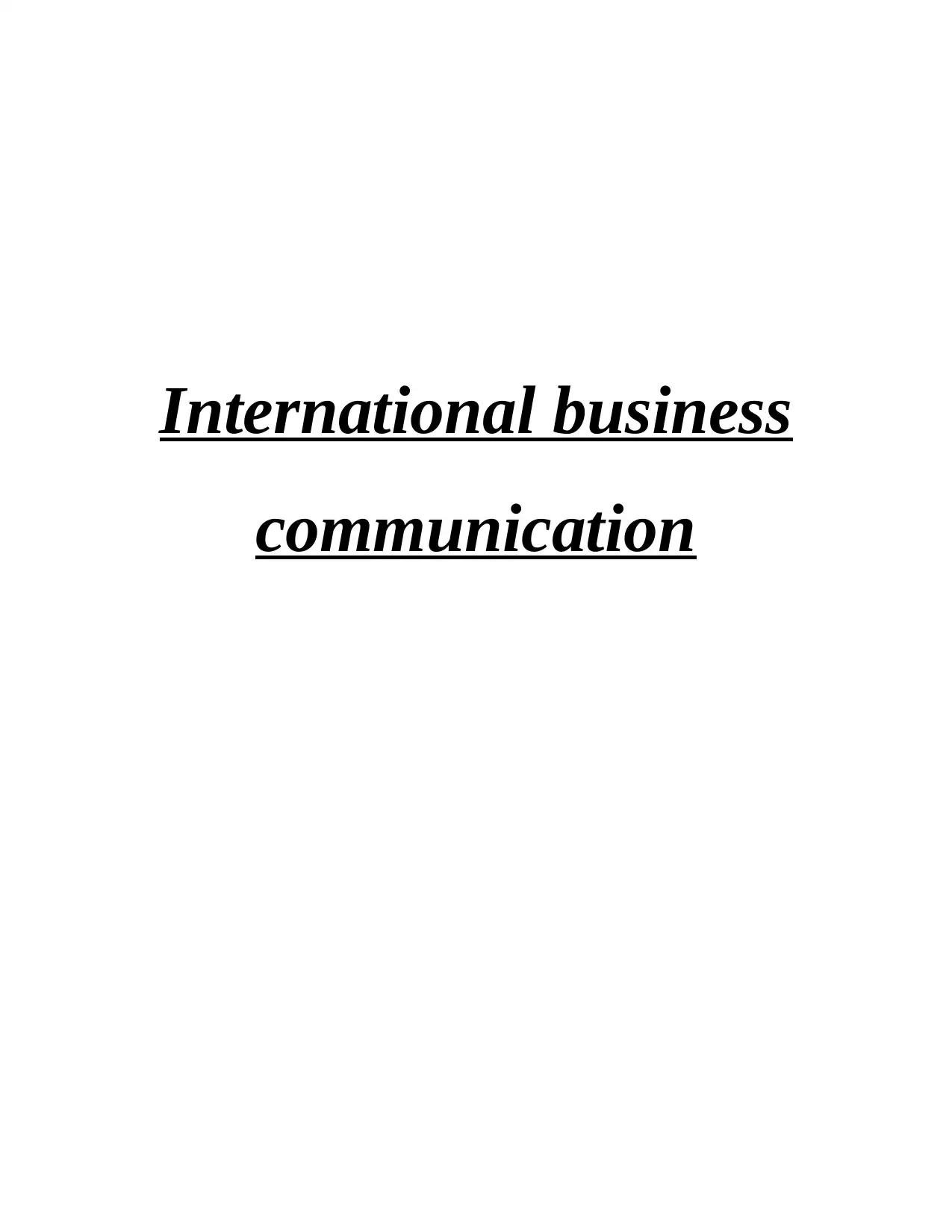
International business
communication
communication
Paraphrase This Document
Need a fresh take? Get an instant paraphrase of this document with our AI Paraphraser
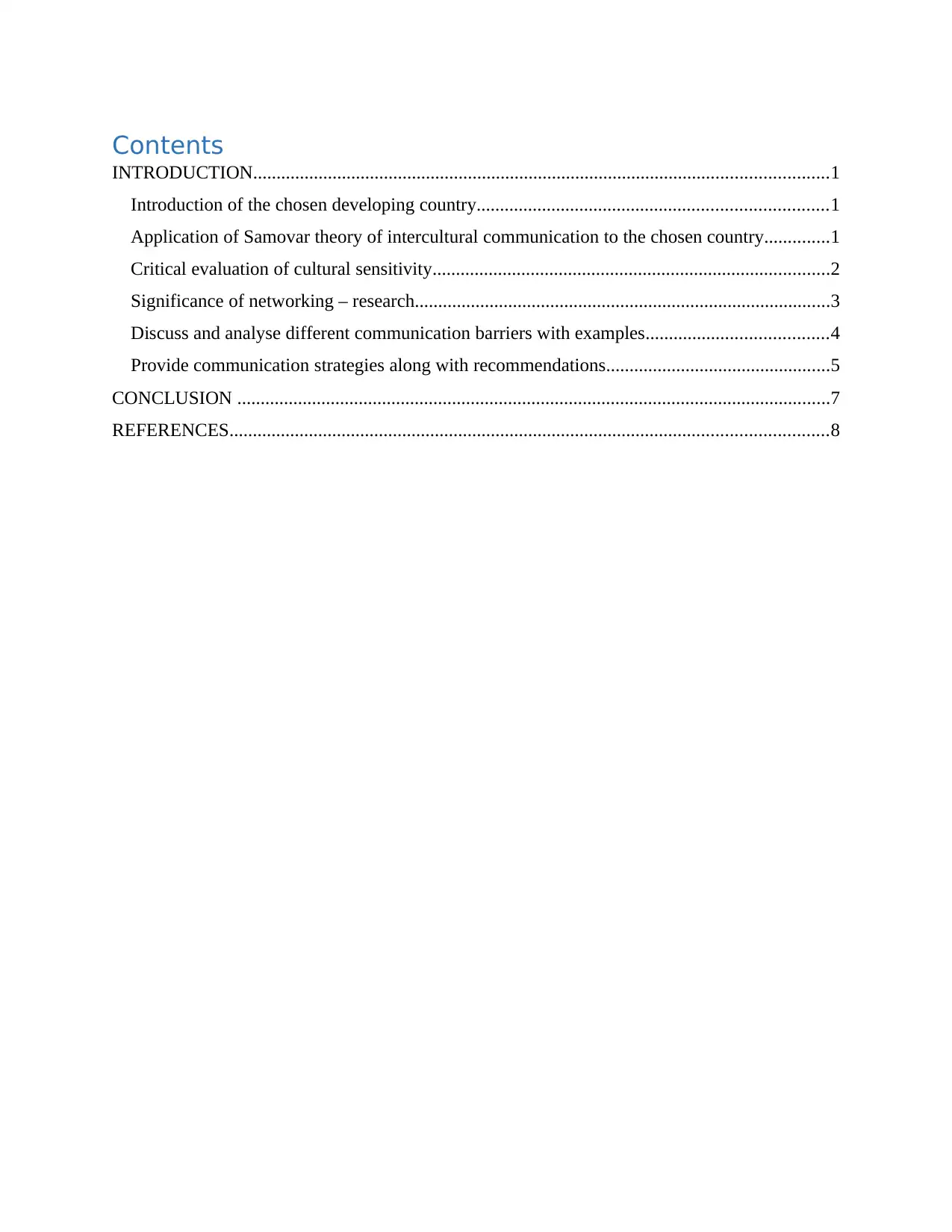
Contents
INTRODUCTION...........................................................................................................................1
Introduction of the chosen developing country...........................................................................1
Application of Samovar theory of intercultural communication to the chosen country..............1
Critical evaluation of cultural sensitivity.....................................................................................2
Significance of networking – research.........................................................................................3
Discuss and analyse different communication barriers with examples.......................................4
Provide communication strategies along with recommendations................................................5
CONCLUSION ...............................................................................................................................7
REFERENCES................................................................................................................................8
INTRODUCTION...........................................................................................................................1
Introduction of the chosen developing country...........................................................................1
Application of Samovar theory of intercultural communication to the chosen country..............1
Critical evaluation of cultural sensitivity.....................................................................................2
Significance of networking – research.........................................................................................3
Discuss and analyse different communication barriers with examples.......................................4
Provide communication strategies along with recommendations................................................5
CONCLUSION ...............................................................................................................................7
REFERENCES................................................................................................................................8

⊘ This is a preview!⊘
Do you want full access?
Subscribe today to unlock all pages.

Trusted by 1+ million students worldwide
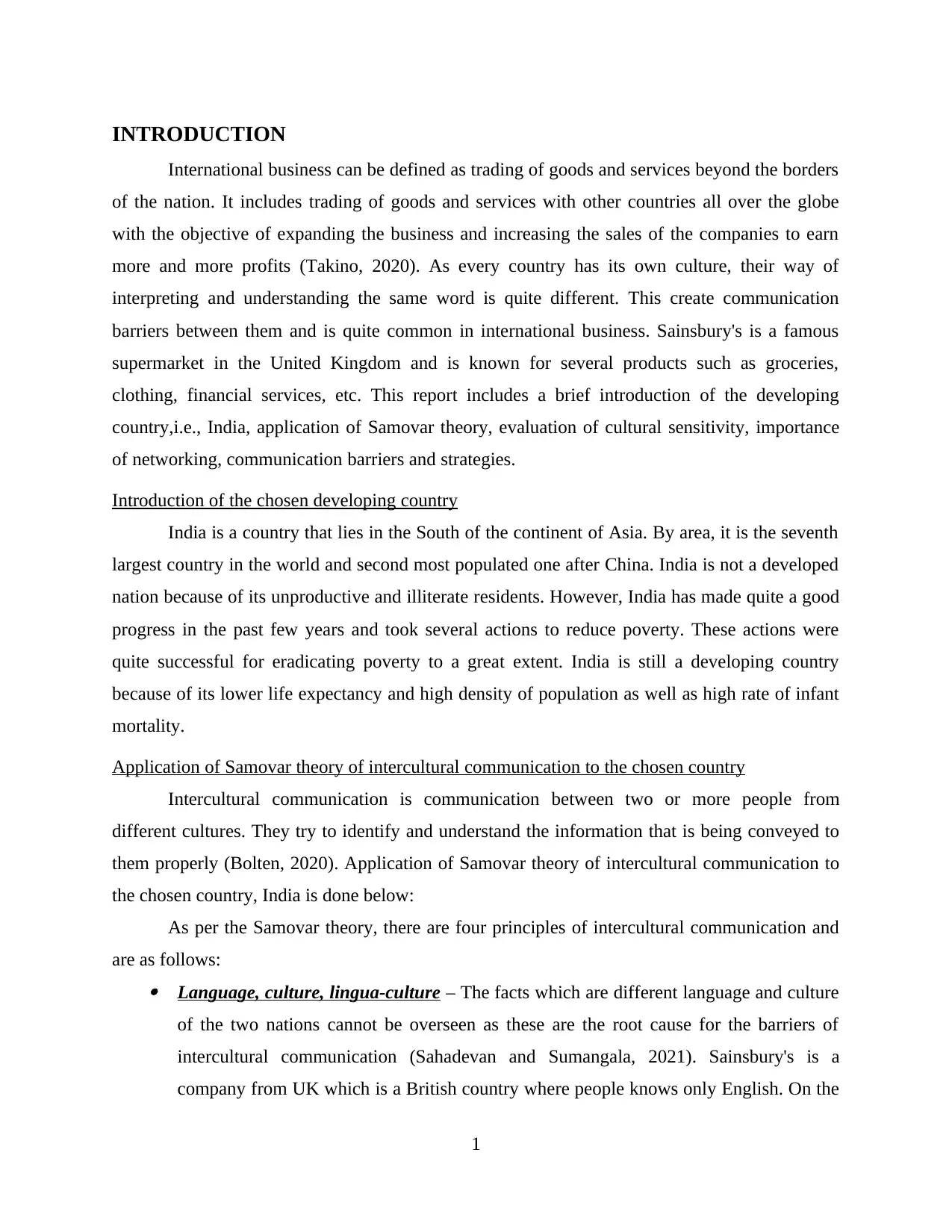
INTRODUCTION
International business can be defined as trading of goods and services beyond the borders
of the nation. It includes trading of goods and services with other countries all over the globe
with the objective of expanding the business and increasing the sales of the companies to earn
more and more profits (Takino, 2020). As every country has its own culture, their way of
interpreting and understanding the same word is quite different. This create communication
barriers between them and is quite common in international business. Sainsbury's is a famous
supermarket in the United Kingdom and is known for several products such as groceries,
clothing, financial services, etc. This report includes a brief introduction of the developing
country,i.e., India, application of Samovar theory, evaluation of cultural sensitivity, importance
of networking, communication barriers and strategies.
Introduction of the chosen developing country
India is a country that lies in the South of the continent of Asia. By area, it is the seventh
largest country in the world and second most populated one after China. India is not a developed
nation because of its unproductive and illiterate residents. However, India has made quite a good
progress in the past few years and took several actions to reduce poverty. These actions were
quite successful for eradicating poverty to a great extent. India is still a developing country
because of its lower life expectancy and high density of population as well as high rate of infant
mortality.
Application of Samovar theory of intercultural communication to the chosen country
Intercultural communication is communication between two or more people from
different cultures. They try to identify and understand the information that is being conveyed to
them properly (Bolten, 2020). Application of Samovar theory of intercultural communication to
the chosen country, India is done below:
As per the Samovar theory, there are four principles of intercultural communication and
are as follows: Language, culture, lingua-culture – The facts which are different language and culture
of the two nations cannot be overseen as these are the root cause for the barriers of
intercultural communication (Sahadevan and Sumangala, 2021). Sainsbury's is a
company from UK which is a British country where people knows only English. On the
1
International business can be defined as trading of goods and services beyond the borders
of the nation. It includes trading of goods and services with other countries all over the globe
with the objective of expanding the business and increasing the sales of the companies to earn
more and more profits (Takino, 2020). As every country has its own culture, their way of
interpreting and understanding the same word is quite different. This create communication
barriers between them and is quite common in international business. Sainsbury's is a famous
supermarket in the United Kingdom and is known for several products such as groceries,
clothing, financial services, etc. This report includes a brief introduction of the developing
country,i.e., India, application of Samovar theory, evaluation of cultural sensitivity, importance
of networking, communication barriers and strategies.
Introduction of the chosen developing country
India is a country that lies in the South of the continent of Asia. By area, it is the seventh
largest country in the world and second most populated one after China. India is not a developed
nation because of its unproductive and illiterate residents. However, India has made quite a good
progress in the past few years and took several actions to reduce poverty. These actions were
quite successful for eradicating poverty to a great extent. India is still a developing country
because of its lower life expectancy and high density of population as well as high rate of infant
mortality.
Application of Samovar theory of intercultural communication to the chosen country
Intercultural communication is communication between two or more people from
different cultures. They try to identify and understand the information that is being conveyed to
them properly (Bolten, 2020). Application of Samovar theory of intercultural communication to
the chosen country, India is done below:
As per the Samovar theory, there are four principles of intercultural communication and
are as follows: Language, culture, lingua-culture – The facts which are different language and culture
of the two nations cannot be overseen as these are the root cause for the barriers of
intercultural communication (Sahadevan and Sumangala, 2021). Sainsbury's is a
company from UK which is a British country where people knows only English. On the
1
Paraphrase This Document
Need a fresh take? Get an instant paraphrase of this document with our AI Paraphraser
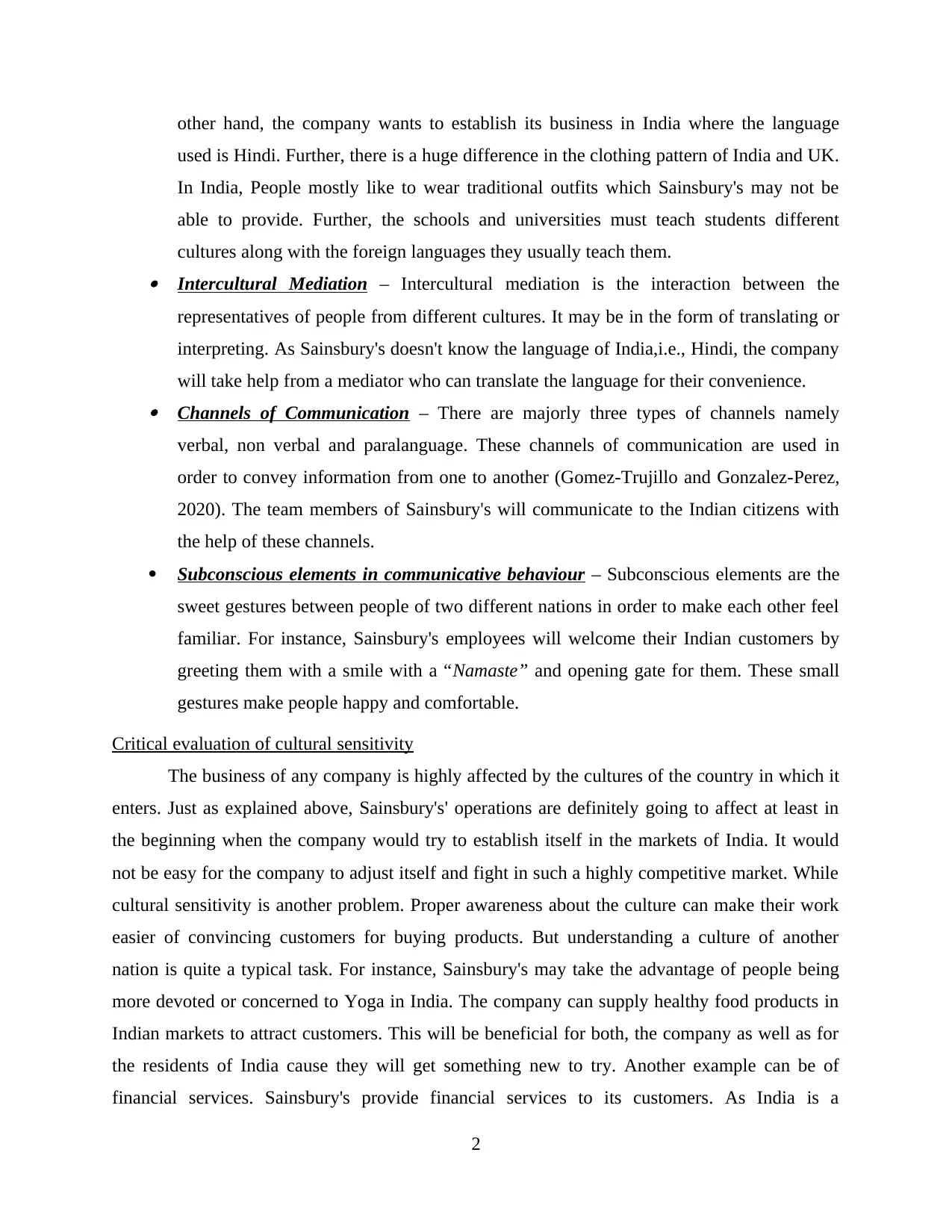
other hand, the company wants to establish its business in India where the language
used is Hindi. Further, there is a huge difference in the clothing pattern of India and UK.
In India, People mostly like to wear traditional outfits which Sainsbury's may not be
able to provide. Further, the schools and universities must teach students different
cultures along with the foreign languages they usually teach them. Intercultural Mediation – Intercultural mediation is the interaction between the
representatives of people from different cultures. It may be in the form of translating or
interpreting. As Sainsbury's doesn't know the language of India,i.e., Hindi, the company
will take help from a mediator who can translate the language for their convenience. Channels of Communication – There are majorly three types of channels namely
verbal, non verbal and paralanguage. These channels of communication are used in
order to convey information from one to another (Gomez-Trujillo and Gonzalez-Perez,
2020). The team members of Sainsbury's will communicate to the Indian citizens with
the help of these channels.
Subconscious elements in communicative behaviour – Subconscious elements are the
sweet gestures between people of two different nations in order to make each other feel
familiar. For instance, Sainsbury's employees will welcome their Indian customers by
greeting them with a smile with a “Namaste” and opening gate for them. These small
gestures make people happy and comfortable.
Critical evaluation of cultural sensitivity
The business of any company is highly affected by the cultures of the country in which it
enters. Just as explained above, Sainsbury's' operations are definitely going to affect at least in
the beginning when the company would try to establish itself in the markets of India. It would
not be easy for the company to adjust itself and fight in such a highly competitive market. While
cultural sensitivity is another problem. Proper awareness about the culture can make their work
easier of convincing customers for buying products. But understanding a culture of another
nation is quite a typical task. For instance, Sainsbury's may take the advantage of people being
more devoted or concerned to Yoga in India. The company can supply healthy food products in
Indian markets to attract customers. This will be beneficial for both, the company as well as for
the residents of India cause they will get something new to try. Another example can be of
financial services. Sainsbury's provide financial services to its customers. As India is a
2
used is Hindi. Further, there is a huge difference in the clothing pattern of India and UK.
In India, People mostly like to wear traditional outfits which Sainsbury's may not be
able to provide. Further, the schools and universities must teach students different
cultures along with the foreign languages they usually teach them. Intercultural Mediation – Intercultural mediation is the interaction between the
representatives of people from different cultures. It may be in the form of translating or
interpreting. As Sainsbury's doesn't know the language of India,i.e., Hindi, the company
will take help from a mediator who can translate the language for their convenience. Channels of Communication – There are majorly three types of channels namely
verbal, non verbal and paralanguage. These channels of communication are used in
order to convey information from one to another (Gomez-Trujillo and Gonzalez-Perez,
2020). The team members of Sainsbury's will communicate to the Indian citizens with
the help of these channels.
Subconscious elements in communicative behaviour – Subconscious elements are the
sweet gestures between people of two different nations in order to make each other feel
familiar. For instance, Sainsbury's employees will welcome their Indian customers by
greeting them with a smile with a “Namaste” and opening gate for them. These small
gestures make people happy and comfortable.
Critical evaluation of cultural sensitivity
The business of any company is highly affected by the cultures of the country in which it
enters. Just as explained above, Sainsbury's' operations are definitely going to affect at least in
the beginning when the company would try to establish itself in the markets of India. It would
not be easy for the company to adjust itself and fight in such a highly competitive market. While
cultural sensitivity is another problem. Proper awareness about the culture can make their work
easier of convincing customers for buying products. But understanding a culture of another
nation is quite a typical task. For instance, Sainsbury's may take the advantage of people being
more devoted or concerned to Yoga in India. The company can supply healthy food products in
Indian markets to attract customers. This will be beneficial for both, the company as well as for
the residents of India cause they will get something new to try. Another example can be of
financial services. Sainsbury's provide financial services to its customers. As India is a
2
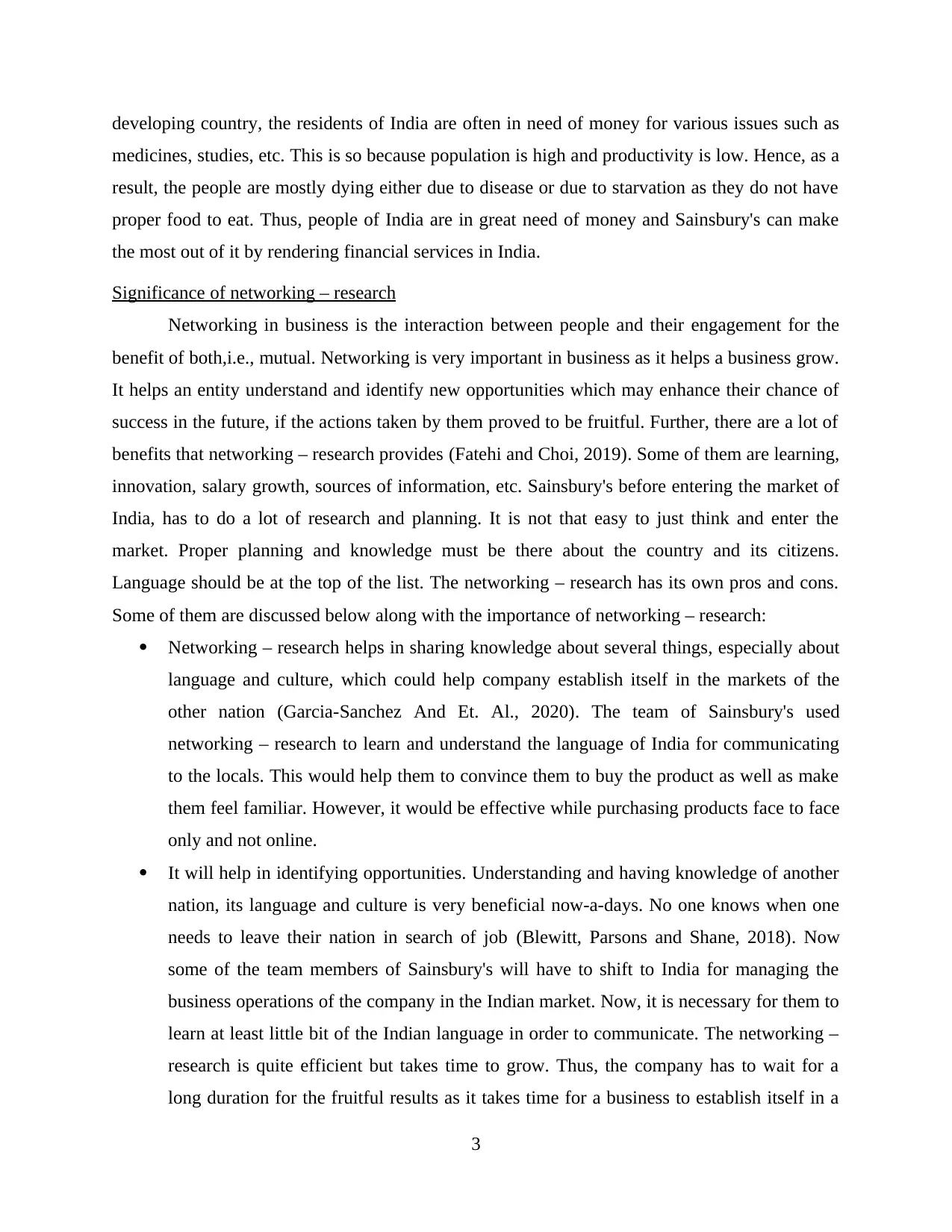
developing country, the residents of India are often in need of money for various issues such as
medicines, studies, etc. This is so because population is high and productivity is low. Hence, as a
result, the people are mostly dying either due to disease or due to starvation as they do not have
proper food to eat. Thus, people of India are in great need of money and Sainsbury's can make
the most out of it by rendering financial services in India.
Significance of networking – research
Networking in business is the interaction between people and their engagement for the
benefit of both,i.e., mutual. Networking is very important in business as it helps a business grow.
It helps an entity understand and identify new opportunities which may enhance their chance of
success in the future, if the actions taken by them proved to be fruitful. Further, there are a lot of
benefits that networking – research provides (Fatehi and Choi, 2019). Some of them are learning,
innovation, salary growth, sources of information, etc. Sainsbury's before entering the market of
India, has to do a lot of research and planning. It is not that easy to just think and enter the
market. Proper planning and knowledge must be there about the country and its citizens.
Language should be at the top of the list. The networking – research has its own pros and cons.
Some of them are discussed below along with the importance of networking – research:
Networking – research helps in sharing knowledge about several things, especially about
language and culture, which could help company establish itself in the markets of the
other nation (Garcia-Sanchez And Et. Al., 2020). The team of Sainsbury's used
networking – research to learn and understand the language of India for communicating
to the locals. This would help them to convince them to buy the product as well as make
them feel familiar. However, it would be effective while purchasing products face to face
only and not online.
It will help in identifying opportunities. Understanding and having knowledge of another
nation, its language and culture is very beneficial now-a-days. No one knows when one
needs to leave their nation in search of job (Blewitt, Parsons and Shane, 2018). Now
some of the team members of Sainsbury's will have to shift to India for managing the
business operations of the company in the Indian market. Now, it is necessary for them to
learn at least little bit of the Indian language in order to communicate. The networking –
research is quite efficient but takes time to grow. Thus, the company has to wait for a
long duration for the fruitful results as it takes time for a business to establish itself in a
3
medicines, studies, etc. This is so because population is high and productivity is low. Hence, as a
result, the people are mostly dying either due to disease or due to starvation as they do not have
proper food to eat. Thus, people of India are in great need of money and Sainsbury's can make
the most out of it by rendering financial services in India.
Significance of networking – research
Networking in business is the interaction between people and their engagement for the
benefit of both,i.e., mutual. Networking is very important in business as it helps a business grow.
It helps an entity understand and identify new opportunities which may enhance their chance of
success in the future, if the actions taken by them proved to be fruitful. Further, there are a lot of
benefits that networking – research provides (Fatehi and Choi, 2019). Some of them are learning,
innovation, salary growth, sources of information, etc. Sainsbury's before entering the market of
India, has to do a lot of research and planning. It is not that easy to just think and enter the
market. Proper planning and knowledge must be there about the country and its citizens.
Language should be at the top of the list. The networking – research has its own pros and cons.
Some of them are discussed below along with the importance of networking – research:
Networking – research helps in sharing knowledge about several things, especially about
language and culture, which could help company establish itself in the markets of the
other nation (Garcia-Sanchez And Et. Al., 2020). The team of Sainsbury's used
networking – research to learn and understand the language of India for communicating
to the locals. This would help them to convince them to buy the product as well as make
them feel familiar. However, it would be effective while purchasing products face to face
only and not online.
It will help in identifying opportunities. Understanding and having knowledge of another
nation, its language and culture is very beneficial now-a-days. No one knows when one
needs to leave their nation in search of job (Blewitt, Parsons and Shane, 2018). Now
some of the team members of Sainsbury's will have to shift to India for managing the
business operations of the company in the Indian market. Now, it is necessary for them to
learn at least little bit of the Indian language in order to communicate. The networking –
research is quite efficient but takes time to grow. Thus, the company has to wait for a
long duration for the fruitful results as it takes time for a business to establish itself in a
3
⊘ This is a preview!⊘
Do you want full access?
Subscribe today to unlock all pages.

Trusted by 1+ million students worldwide
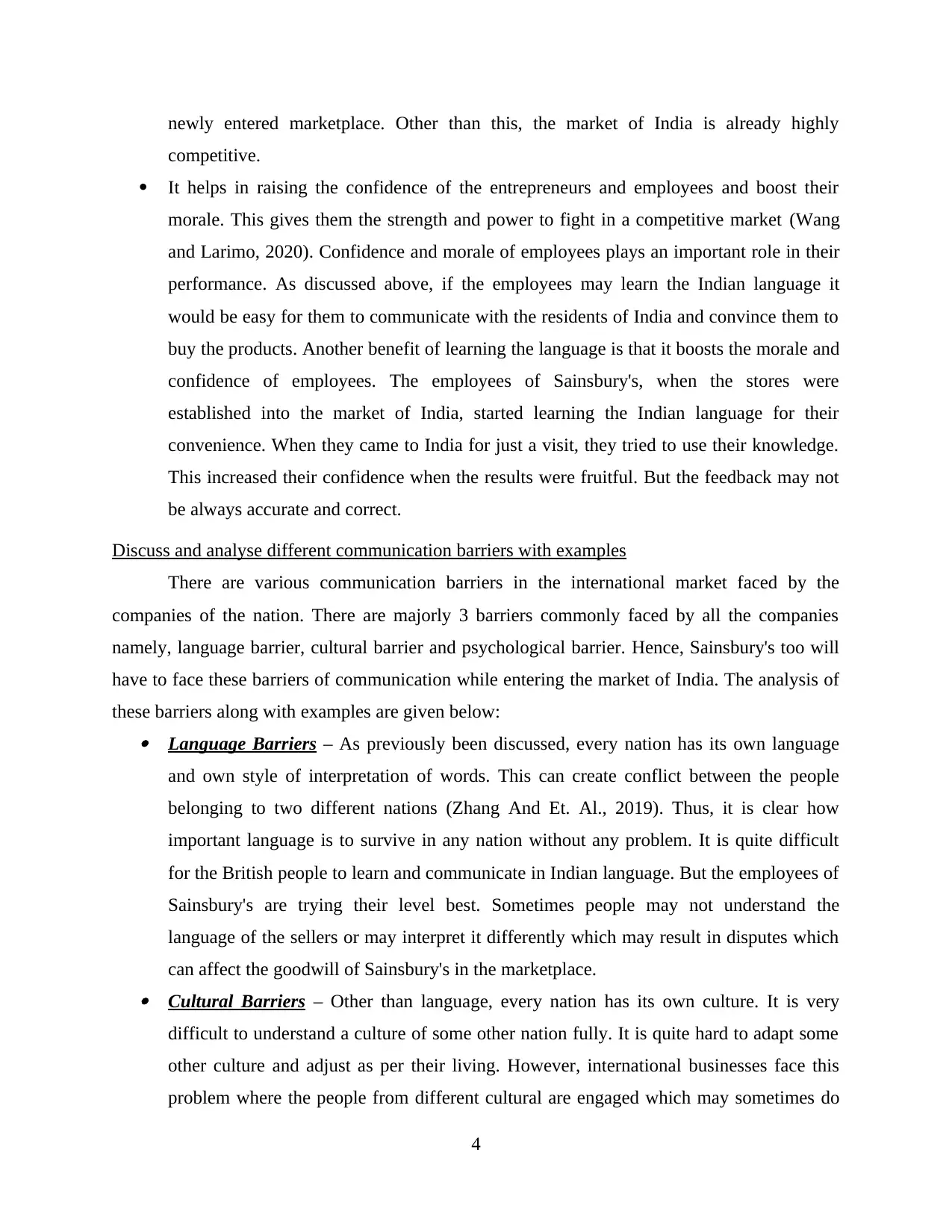
newly entered marketplace. Other than this, the market of India is already highly
competitive.
It helps in raising the confidence of the entrepreneurs and employees and boost their
morale. This gives them the strength and power to fight in a competitive market (Wang
and Larimo, 2020). Confidence and morale of employees plays an important role in their
performance. As discussed above, if the employees may learn the Indian language it
would be easy for them to communicate with the residents of India and convince them to
buy the products. Another benefit of learning the language is that it boosts the morale and
confidence of employees. The employees of Sainsbury's, when the stores were
established into the market of India, started learning the Indian language for their
convenience. When they came to India for just a visit, they tried to use their knowledge.
This increased their confidence when the results were fruitful. But the feedback may not
be always accurate and correct.
Discuss and analyse different communication barriers with examples
There are various communication barriers in the international market faced by the
companies of the nation. There are majorly 3 barriers commonly faced by all the companies
namely, language barrier, cultural barrier and psychological barrier. Hence, Sainsbury's too will
have to face these barriers of communication while entering the market of India. The analysis of
these barriers along with examples are given below: Language Barriers – As previously been discussed, every nation has its own language
and own style of interpretation of words. This can create conflict between the people
belonging to two different nations (Zhang And Et. Al., 2019). Thus, it is clear how
important language is to survive in any nation without any problem. It is quite difficult
for the British people to learn and communicate in Indian language. But the employees of
Sainsbury's are trying their level best. Sometimes people may not understand the
language of the sellers or may interpret it differently which may result in disputes which
can affect the goodwill of Sainsbury's in the marketplace. Cultural Barriers – Other than language, every nation has its own culture. It is very
difficult to understand a culture of some other nation fully. It is quite hard to adapt some
other culture and adjust as per their living. However, international businesses face this
problem where the people from different cultural are engaged which may sometimes do
4
competitive.
It helps in raising the confidence of the entrepreneurs and employees and boost their
morale. This gives them the strength and power to fight in a competitive market (Wang
and Larimo, 2020). Confidence and morale of employees plays an important role in their
performance. As discussed above, if the employees may learn the Indian language it
would be easy for them to communicate with the residents of India and convince them to
buy the products. Another benefit of learning the language is that it boosts the morale and
confidence of employees. The employees of Sainsbury's, when the stores were
established into the market of India, started learning the Indian language for their
convenience. When they came to India for just a visit, they tried to use their knowledge.
This increased their confidence when the results were fruitful. But the feedback may not
be always accurate and correct.
Discuss and analyse different communication barriers with examples
There are various communication barriers in the international market faced by the
companies of the nation. There are majorly 3 barriers commonly faced by all the companies
namely, language barrier, cultural barrier and psychological barrier. Hence, Sainsbury's too will
have to face these barriers of communication while entering the market of India. The analysis of
these barriers along with examples are given below: Language Barriers – As previously been discussed, every nation has its own language
and own style of interpretation of words. This can create conflict between the people
belonging to two different nations (Zhang And Et. Al., 2019). Thus, it is clear how
important language is to survive in any nation without any problem. It is quite difficult
for the British people to learn and communicate in Indian language. But the employees of
Sainsbury's are trying their level best. Sometimes people may not understand the
language of the sellers or may interpret it differently which may result in disputes which
can affect the goodwill of Sainsbury's in the marketplace. Cultural Barriers – Other than language, every nation has its own culture. It is very
difficult to understand a culture of some other nation fully. It is quite hard to adapt some
other culture and adjust as per their living. However, international businesses face this
problem where the people from different cultural are engaged which may sometimes do
4
Paraphrase This Document
Need a fresh take? Get an instant paraphrase of this document with our AI Paraphraser

not get comfortable with each other due to the differences in their cultures. There is huge
difference in the cultures of India and Britain, just like East and West. Culture includes
dressing, religion, beliefs and many more. Thus, it would be very typical for the
employees of Sainsbury's to deal with the Indian population and their culture.
Psychological Barriers – There are several hurdles which lie in the way of an effective
communication. Psychological barriers are one of the barriers that the company has to
deal with while entering a new market in a nation other than its domestic country. These
barriers are connected with the psychological and mental issues that people face in their
day to day life (Iurkov and Benito, 2020). Sainsbury's employees have to deal with their
customer's anger, nervousness, confusion, fear or any other psychological factor. It would
be hard to deal with these factors. While on the other hand, the employees have to
suppress their psychological emotions in front of customers to preserve the prestige of
company in the marketplace. Hence, it would be a tough job for the British employees to
work in India and may go back. As a result, Sainsbury's will have to hire Indian
employees to manage their stores and it would help in reducing unemployment.
Provide communication strategies along with recommendations
In order to overcome the barriers which the businesses have to face while dealing in the
international markets, the companies make some strategies which are known as communication
strategies (Larasati, Jamil and Briandana, 2021). Some of the strategies which can be used by
Sainsbury's to avoid communication barriers in Indian markets are: Hire multilingual staff – Sainsbury's should hire staff which can speak the language of
both the nations. This would help them a lot in selling their products easily. By creating multiple versions of websites – Websites in their languages enable the
people make them understand them well and rely on them more easily. Have a face to face communication – Not everything should be online or through
email. Real time communication or face to face communication is important for
organizations to build good relation with the country and in the market it enters in.
Thus, it it is important for Sainsbury's to make a regular visit to India in order to make
relations with the huge and renowned marketers in the Indian market.
5
difference in the cultures of India and Britain, just like East and West. Culture includes
dressing, religion, beliefs and many more. Thus, it would be very typical for the
employees of Sainsbury's to deal with the Indian population and their culture.
Psychological Barriers – There are several hurdles which lie in the way of an effective
communication. Psychological barriers are one of the barriers that the company has to
deal with while entering a new market in a nation other than its domestic country. These
barriers are connected with the psychological and mental issues that people face in their
day to day life (Iurkov and Benito, 2020). Sainsbury's employees have to deal with their
customer's anger, nervousness, confusion, fear or any other psychological factor. It would
be hard to deal with these factors. While on the other hand, the employees have to
suppress their psychological emotions in front of customers to preserve the prestige of
company in the marketplace. Hence, it would be a tough job for the British employees to
work in India and may go back. As a result, Sainsbury's will have to hire Indian
employees to manage their stores and it would help in reducing unemployment.
Provide communication strategies along with recommendations
In order to overcome the barriers which the businesses have to face while dealing in the
international markets, the companies make some strategies which are known as communication
strategies (Larasati, Jamil and Briandana, 2021). Some of the strategies which can be used by
Sainsbury's to avoid communication barriers in Indian markets are: Hire multilingual staff – Sainsbury's should hire staff which can speak the language of
both the nations. This would help them a lot in selling their products easily. By creating multiple versions of websites – Websites in their languages enable the
people make them understand them well and rely on them more easily. Have a face to face communication – Not everything should be online or through
email. Real time communication or face to face communication is important for
organizations to build good relation with the country and in the market it enters in.
Thus, it it is important for Sainsbury's to make a regular visit to India in order to make
relations with the huge and renowned marketers in the Indian market.
5
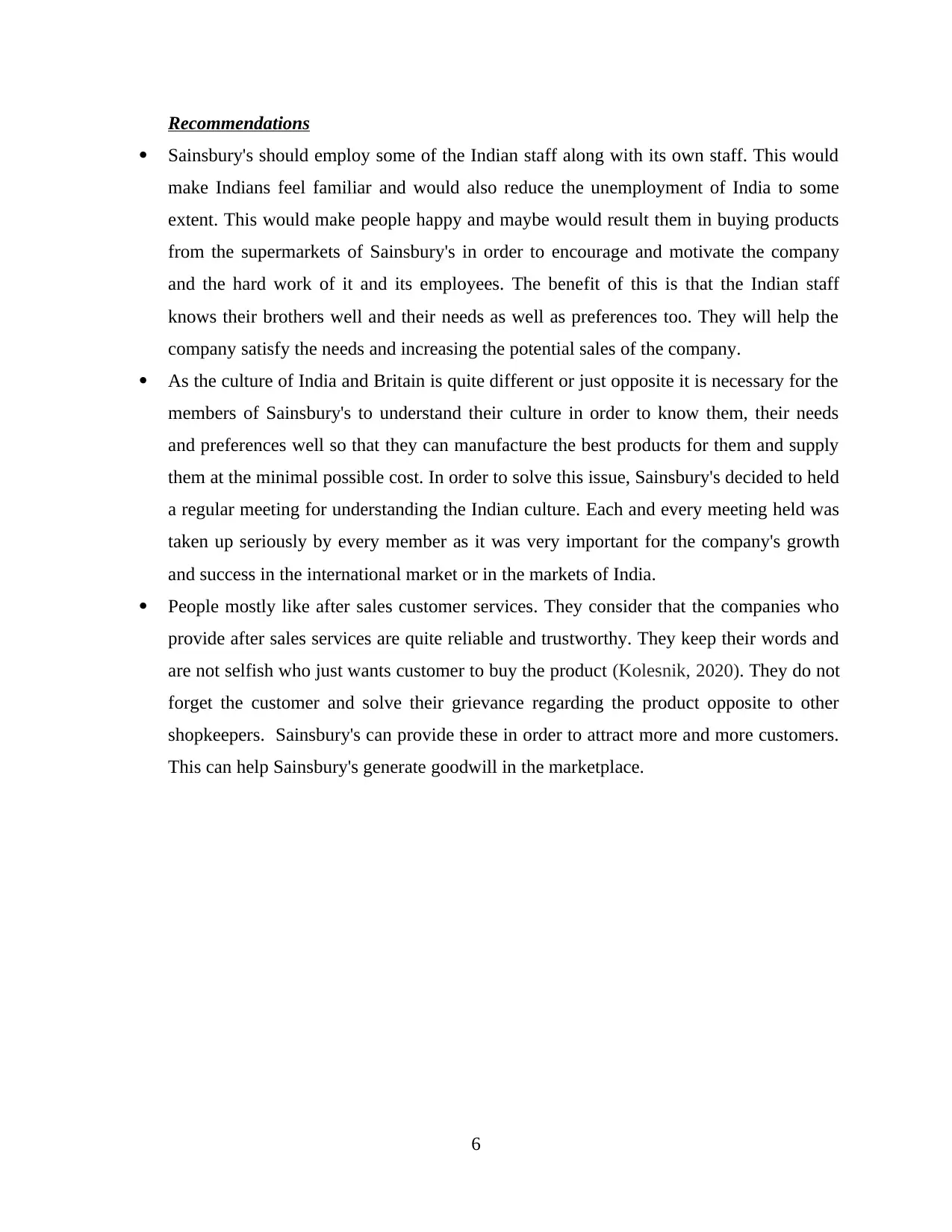
Recommendations
Sainsbury's should employ some of the Indian staff along with its own staff. This would
make Indians feel familiar and would also reduce the unemployment of India to some
extent. This would make people happy and maybe would result them in buying products
from the supermarkets of Sainsbury's in order to encourage and motivate the company
and the hard work of it and its employees. The benefit of this is that the Indian staff
knows their brothers well and their needs as well as preferences too. They will help the
company satisfy the needs and increasing the potential sales of the company.
As the culture of India and Britain is quite different or just opposite it is necessary for the
members of Sainsbury's to understand their culture in order to know them, their needs
and preferences well so that they can manufacture the best products for them and supply
them at the minimal possible cost. In order to solve this issue, Sainsbury's decided to held
a regular meeting for understanding the Indian culture. Each and every meeting held was
taken up seriously by every member as it was very important for the company's growth
and success in the international market or in the markets of India.
People mostly like after sales customer services. They consider that the companies who
provide after sales services are quite reliable and trustworthy. They keep their words and
are not selfish who just wants customer to buy the product (Kolesnik, 2020). They do not
forget the customer and solve their grievance regarding the product opposite to other
shopkeepers. Sainsbury's can provide these in order to attract more and more customers.
This can help Sainsbury's generate goodwill in the marketplace.
6
Sainsbury's should employ some of the Indian staff along with its own staff. This would
make Indians feel familiar and would also reduce the unemployment of India to some
extent. This would make people happy and maybe would result them in buying products
from the supermarkets of Sainsbury's in order to encourage and motivate the company
and the hard work of it and its employees. The benefit of this is that the Indian staff
knows their brothers well and their needs as well as preferences too. They will help the
company satisfy the needs and increasing the potential sales of the company.
As the culture of India and Britain is quite different or just opposite it is necessary for the
members of Sainsbury's to understand their culture in order to know them, their needs
and preferences well so that they can manufacture the best products for them and supply
them at the minimal possible cost. In order to solve this issue, Sainsbury's decided to held
a regular meeting for understanding the Indian culture. Each and every meeting held was
taken up seriously by every member as it was very important for the company's growth
and success in the international market or in the markets of India.
People mostly like after sales customer services. They consider that the companies who
provide after sales services are quite reliable and trustworthy. They keep their words and
are not selfish who just wants customer to buy the product (Kolesnik, 2020). They do not
forget the customer and solve their grievance regarding the product opposite to other
shopkeepers. Sainsbury's can provide these in order to attract more and more customers.
This can help Sainsbury's generate goodwill in the marketplace.
6
⊘ This is a preview!⊘
Do you want full access?
Subscribe today to unlock all pages.

Trusted by 1+ million students worldwide
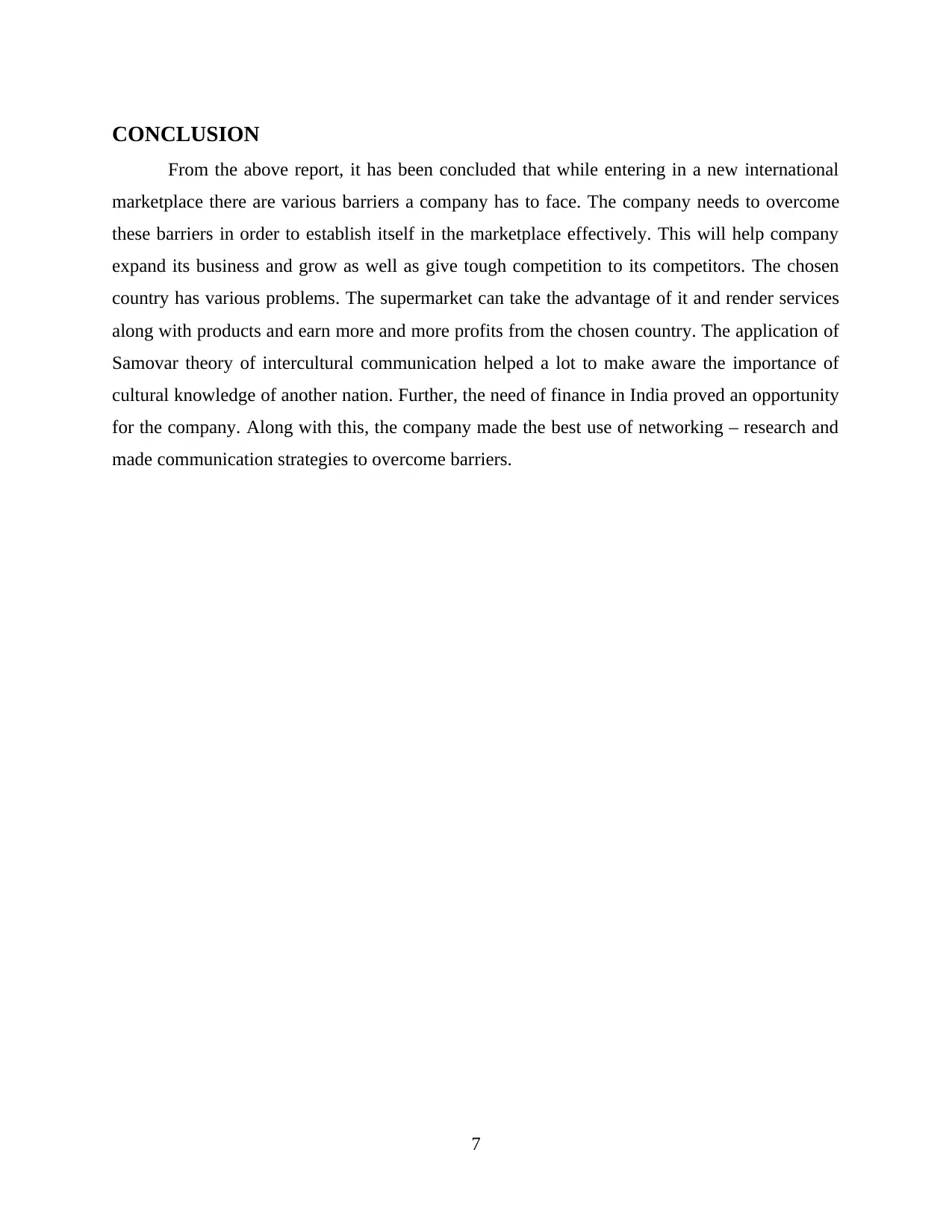
CONCLUSION
From the above report, it has been concluded that while entering in a new international
marketplace there are various barriers a company has to face. The company needs to overcome
these barriers in order to establish itself in the marketplace effectively. This will help company
expand its business and grow as well as give tough competition to its competitors. The chosen
country has various problems. The supermarket can take the advantage of it and render services
along with products and earn more and more profits from the chosen country. The application of
Samovar theory of intercultural communication helped a lot to make aware the importance of
cultural knowledge of another nation. Further, the need of finance in India proved an opportunity
for the company. Along with this, the company made the best use of networking – research and
made communication strategies to overcome barriers.
7
From the above report, it has been concluded that while entering in a new international
marketplace there are various barriers a company has to face. The company needs to overcome
these barriers in order to establish itself in the marketplace effectively. This will help company
expand its business and grow as well as give tough competition to its competitors. The chosen
country has various problems. The supermarket can take the advantage of it and render services
along with products and earn more and more profits from the chosen country. The application of
Samovar theory of intercultural communication helped a lot to make aware the importance of
cultural knowledge of another nation. Further, the need of finance in India proved an opportunity
for the company. Along with this, the company made the best use of networking – research and
made communication strategies to overcome barriers.
7
Paraphrase This Document
Need a fresh take? Get an instant paraphrase of this document with our AI Paraphraser
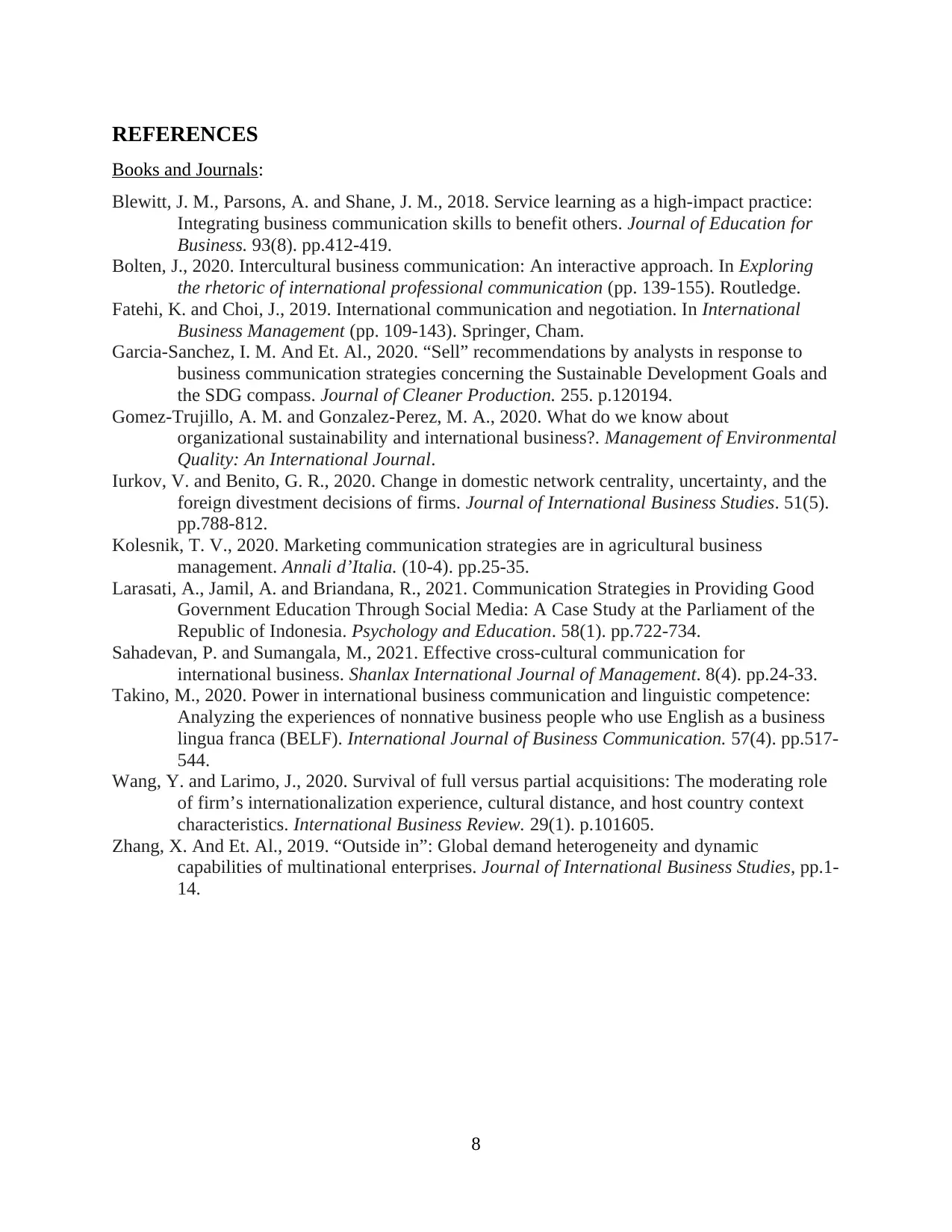
REFERENCES
Books and Journals:
Blewitt, J. M., Parsons, A. and Shane, J. M., 2018. Service learning as a high-impact practice:
Integrating business communication skills to benefit others. Journal of Education for
Business. 93(8). pp.412-419.
Bolten, J., 2020. Intercultural business communication: An interactive approach. In Exploring
the rhetoric of international professional communication (pp. 139-155). Routledge.
Fatehi, K. and Choi, J., 2019. International communication and negotiation. In International
Business Management (pp. 109-143). Springer, Cham.
Garcia-Sanchez, I. M. And Et. Al., 2020. “Sell” recommendations by analysts in response to
business communication strategies concerning the Sustainable Development Goals and
the SDG compass. Journal of Cleaner Production. 255. p.120194.
Gomez-Trujillo, A. M. and Gonzalez-Perez, M. A., 2020. What do we know about
organizational sustainability and international business?. Management of Environmental
Quality: An International Journal.
Iurkov, V. and Benito, G. R., 2020. Change in domestic network centrality, uncertainty, and the
foreign divestment decisions of firms. Journal of International Business Studies. 51(5).
pp.788-812.
Kolesnik, T. V., 2020. Marketing communication strategies are in agricultural business
management. Annali d’Italia. (10-4). pp.25-35.
Larasati, A., Jamil, A. and Briandana, R., 2021. Communication Strategies in Providing Good
Government Education Through Social Media: A Case Study at the Parliament of the
Republic of Indonesia. Psychology and Education. 58(1). pp.722-734.
Sahadevan, P. and Sumangala, M., 2021. Effective cross-cultural communication for
international business. Shanlax International Journal of Management. 8(4). pp.24-33.
Takino, M., 2020. Power in international business communication and linguistic competence:
Analyzing the experiences of nonnative business people who use English as a business
lingua franca (BELF). International Journal of Business Communication. 57(4). pp.517-
544.
Wang, Y. and Larimo, J., 2020. Survival of full versus partial acquisitions: The moderating role
of firm’s internationalization experience, cultural distance, and host country context
characteristics. International Business Review. 29(1). p.101605.
Zhang, X. And Et. Al., 2019. “Outside in”: Global demand heterogeneity and dynamic
capabilities of multinational enterprises. Journal of International Business Studies, pp.1-
14.
8
Books and Journals:
Blewitt, J. M., Parsons, A. and Shane, J. M., 2018. Service learning as a high-impact practice:
Integrating business communication skills to benefit others. Journal of Education for
Business. 93(8). pp.412-419.
Bolten, J., 2020. Intercultural business communication: An interactive approach. In Exploring
the rhetoric of international professional communication (pp. 139-155). Routledge.
Fatehi, K. and Choi, J., 2019. International communication and negotiation. In International
Business Management (pp. 109-143). Springer, Cham.
Garcia-Sanchez, I. M. And Et. Al., 2020. “Sell” recommendations by analysts in response to
business communication strategies concerning the Sustainable Development Goals and
the SDG compass. Journal of Cleaner Production. 255. p.120194.
Gomez-Trujillo, A. M. and Gonzalez-Perez, M. A., 2020. What do we know about
organizational sustainability and international business?. Management of Environmental
Quality: An International Journal.
Iurkov, V. and Benito, G. R., 2020. Change in domestic network centrality, uncertainty, and the
foreign divestment decisions of firms. Journal of International Business Studies. 51(5).
pp.788-812.
Kolesnik, T. V., 2020. Marketing communication strategies are in agricultural business
management. Annali d’Italia. (10-4). pp.25-35.
Larasati, A., Jamil, A. and Briandana, R., 2021. Communication Strategies in Providing Good
Government Education Through Social Media: A Case Study at the Parliament of the
Republic of Indonesia. Psychology and Education. 58(1). pp.722-734.
Sahadevan, P. and Sumangala, M., 2021. Effective cross-cultural communication for
international business. Shanlax International Journal of Management. 8(4). pp.24-33.
Takino, M., 2020. Power in international business communication and linguistic competence:
Analyzing the experiences of nonnative business people who use English as a business
lingua franca (BELF). International Journal of Business Communication. 57(4). pp.517-
544.
Wang, Y. and Larimo, J., 2020. Survival of full versus partial acquisitions: The moderating role
of firm’s internationalization experience, cultural distance, and host country context
characteristics. International Business Review. 29(1). p.101605.
Zhang, X. And Et. Al., 2019. “Outside in”: Global demand heterogeneity and dynamic
capabilities of multinational enterprises. Journal of International Business Studies, pp.1-
14.
8
1 out of 11
Related Documents
Your All-in-One AI-Powered Toolkit for Academic Success.
+13062052269
info@desklib.com
Available 24*7 on WhatsApp / Email
![[object Object]](/_next/static/media/star-bottom.7253800d.svg)
Unlock your academic potential
Copyright © 2020–2026 A2Z Services. All Rights Reserved. Developed and managed by ZUCOL.


